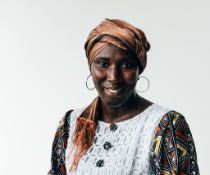
Zentrum für Marine Tropenökologie (ZMT)
Tel.: +49 (0)421 23800 - 0
Email:
Universität Bremen, Room: Fahrenheitstr. 8 28359 Bremen Room: 3102 (1st floor)
Affiliated Ph.D. Fellow, Cohort 2022
Dissertation topic
Social processes in fisheries and Marine Protected Areas governance in Senegal: Power asymmetries, Actors relationship and Institutional changes.
Dissertation abstract
Fisheries have today reached a critical threshold in Senegal. With the increasing pressure on fishing resources: several species are over-exploited; productivity is declining, and conflicts are arising among categories of fishermen. Marine protected Areas (MPA) constitute especially favorable sites for the renewal of fisheries resources and are considered to be essential instruments for fisheries management despite the governance issues they face. Nevertheless, with the growing number of conservation zones on the coastal areas traditionally occupied by artisanal fishing, the influence of MPAs governance on fishery resources and management has to be investigated. This study therefore seeks to analyze the relationship between protection and fishing governance and the implications on coastal communities/ artisanal fishermen in Senegal. It is structured as cumulative papers addressing three main questions. Literature, my own experience in the field and social-ecological characteristics indicate that power asymmetries between actors will be an important issue to consider. Therefore, the first paper revisits the literature on the concept of power in marine realm to understand how the concept of power has been applied in research in the field of fisheries and marine ecosystems management? The results of this first paper will guide the empirical research and analysis of the second paper which focuses on the question to what extent the interaction between the diverse management bodies of MPA and fisheries is shaping its governance and sustainability? It will apply a qualitative network analysis to better describe and interpret actors’ relationship and influencing power. The third paper which uses processes tracing seeks to understand how did fisheries and MPA governance changed over time, what drove this change and what have been the consequences for artisanal fishers? To provide answers for these questions, empirical studies will be conducted in Saint Louis and Djifer located respectively in the North and Center of the Senegal coast. The overlapping of stakeholders and institutions making the fields of fisheries and conservation in Senegal complex justify the choice of the Institutional Analysis and Development framework which will serve as organizing scaffold that will guide our empirical research.
Academic Supervisors
Achim Schlüter
Roy Karadag
Michael Murunga
